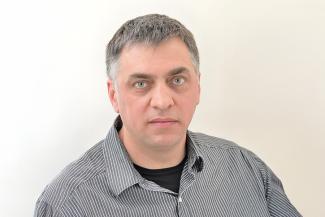Irinel Chiorescu

Contact Information
Ph.D., Joseph Fourier University, Grenoble, France, 2000
Following a BSc. from UAIC-Iasi, Romania he performs a PhD. on molecular quantum magnets at the University of Grenoble - CNRS (experimental cond matter). Then he carries out a 3-year postdoctoral research program at the Delft University of Technology, Netherlands with results in the superconducting quantum computing area. A brief postdoc at Michigan State University follows in 2004. Since 2005, he is at FSU - Department of Physics and affiliated to the National MagLab. The research laboratory is located at MagLab.
Dr Chiorescu’s research is focusing on the coherent motion of magnetic moments of various nature; to that end, we are using quantum devices that combine the quantum nature of spins and photons. A number of dedicated experimental techniques are used in our laboratory such as: sensitive microwave excitation and detection (continuous and pulsed), fast data acquisition, low temperatures in a dilution refrigerator, vector magnetic field, etc.
Understanding of spin coherence in solid-state materials has direct implications at both fundamental and applied levels because it connects concepts from atomic physics, quantum optics, solid state physics, microwave engineering, and so forth, all applied in the burgeoning field of quantum information. Nanofabrication capabilities allows us to build superconducting devices such as on-chip SQUIDs and resonators, on which a mesoscopic sample can be placed and studied.
Our efforts are focused on spin qubits. Manipulating spin quantum bits, however, is a delicate process, and photons are an ideal choice as they interact with quantum systems in predictable ways. A natural way of driving spin orientation is by using electromagnetic fields (photons) and in our group we explore the properties of spin-photon dressed states in various materials. Photons can be used to entangle and transfer the quantum information between spins and other types of qubits (like superconducting ones) or the cavity modes of an on-chip resonator.
We are in particular interested in diluted spin systems (ions or molecular magnets) in which the spin-spin interactions are naturally reduced. The decrease in unwanted interactions brings an increase in the spin phase coherence. Such systems can show cooperative quantum phenomena and also allows to study the quantum physics of a single spin since its signal is amplified by the number of independent spins in a sample. We perform experiments in the so-called strong coupling regime which opens the way to perform quantum measurements with detuned cavities or use the spins as future quantum memories.
For more details, please visit group’s website at https://qsd.magnet.fsu.edu
